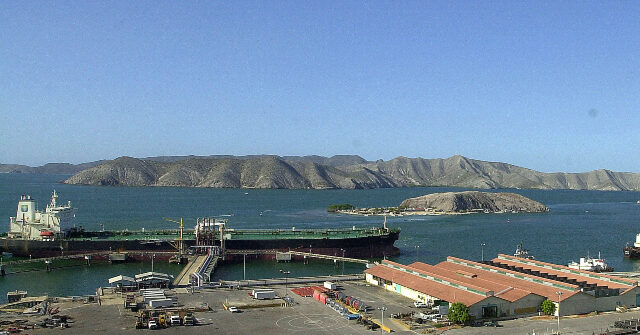Traders have rebranded more than one billion dollars worth of Venezuelan oil shipments to China as Brazilian crude over the past year to circumvent U.S. oil sanctions, Reuters reported on Monday.
Reuters, citing information obtained from “two tanker tracking firms, company documents, and four traders,” revealed that independent Chinese refiners are purchasing oil shipments from countries that the United States has imposed sanctions on, such as Venezuela, with Malaysia serving as a key trans-shipment hub for Venezuelan and Iranian crude, which is also subject to U.S. sanctions.
President Donald Trump imposed sanctions on the Venezuelan state-owned oil company PDVSA in 2019 in response to the extensive list of human rights violations committed by the regime of socialist dictator Nicolás Maduro against its own people. In late 2023, former U.S. President Joe Biden temporarily lifted the oil sanctions as part of a six-month-long sanctions relief package in exchange for vague promises towards holding a “free and fair” presidential election sometime in 2024.
No such free election took place in Venezuela; instead Maduro launched a new brutal persecution campaign and proclaimed himself the “winner” of a fraudulent election on July 28, 2024.
In March, President Trump announced that countries that purchase Venezuelan oil and gas would be subject to an additional 25-percent “secondary tariff.” China condemned the announcement at the time and demanded that the United States cease its “interference” in Venezuela.
Reuters stated in its report that in July 2024 traders began illicitly rebranding Venezuelan oil as being from Brazil, which allows tankers to ship it directly to China, skipping Malaysian stop-overs and shortening the trip by about four days. A trader who spoke to Reuters under condition of anonymity explained that in addition to shortening the trip, passing off the cargoes as Brazilian helps them secure bank financing.
“Since sanctions have been in place, oil traders have transferred oil from one ship to another at sea to disguise the origin of Venezuelan crude before it is shipped to China, which is the world’s biggest crude importer,” Reuters’ report read. The disguise requires the shippers to alter location signals to obscure the origin of the cargo as Venezuela, the news agency claimed, and the shippers’ preferred decoy origin, according to a variety of evidentiary data, is Brazil.
Reuters explained that, according to Brazil’s state oil company Petrobras, Chinese refiners regularly buy Brazilian crude but Brazil rarely exports any bitumen blend, as Brazil’s typical crude grades for export are classified as medium-sweet oil from its prolific offshore fields known as pre-salt.
Trading sources, tanker tracking data, and internal PDVSA documents reviewed by Reuters indicate that many crude cargoes entering China branded as “Brazilian bitumen” actually contain Venezuela’s Merey crude oil blend, which is “typically bought by China’s independent refiners from Venezuela’s state-run PDVSA through intermediaries.”
Chinese traders say the long-held practice of branding Merey as bitumen blend allows refiners to import it without it counting towards “government crude oil import quotas,” Reuters said.
“To effect the switch, dealers change the documentation of the shipments to Brazilian origin by providing a new certificate of origin for the oil, without sending vessels near Brazil or going through any ship-to-ship operations, three of the traders said,” according to the outlet.
Reuters explained that, according to PDVSA documentation and additional tracker data, several vessels chartered by Hangzhou Energy, an intermediary of Venezuelan crude, have “spoofed” their signals this year, making it appear as if they were in Brazil while loading the cargo in Venezuela. According to the documentation, Hangzhou Energy has loaded crude from Venezuela as an intermediary since 2021 and its ships were caught “spoofing” signals to make their origin appear to be Brazil.
China’s customs agency, PDVSA, and Venezuelan and Brazilian authorities did not reply to Reuters’ request for comment. Reuters pointed out that it was unable to locate a contact for Hangzhou Energy.
During a visit to China in April, Venezuelan Vice President Delcy Rodríguez reportedly asked Chinese officials to increase their oil purchases ahead of the impending termination of the Biden-era license granted to California-based Chevron that allowed the company to resume oil production in Venezuela and sell Venezuelan oil in American markets. The license is set to expire on Tuesday, May 27, 2025, at 12:01 a.m. Eastern Daylight Time.
Although China “officially” stopped purchasing Venezuelan oil in August 2019 in compliance with President Trump’s sanctions on PDVSA, reports published in 2022 indicated that China had been providing assistance to PDVSA that allowed it to evade the sanctions since at least November 2020, shipping “millions” of barrels of oil through Chinese state-owned defense firm tankers.
Christian K. Caruzo is a Venezuelan writer and documents life under socialism. You can follow him on Twitter here.
Read the full article here
